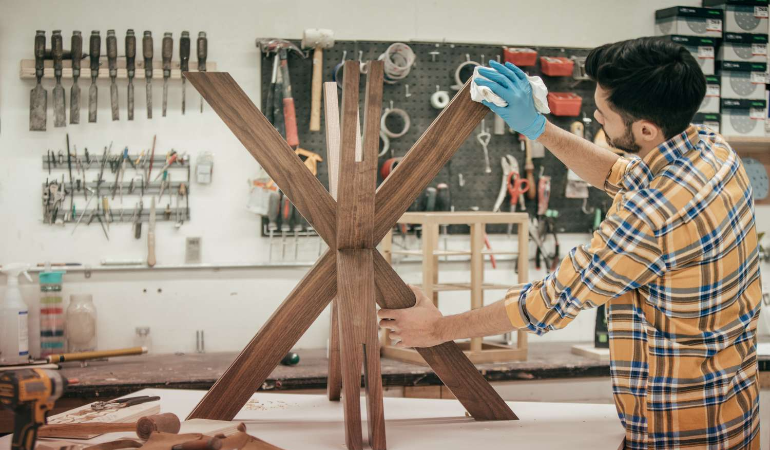
The construction industry is not limited by geography, whether you reside in one of the country’s metropolitan cities or a regional town. Population explosion around the world has created a surge for skilled construction workers- skilled carpenters in particular. As an essential part of the world economy, construction will always need skilled workers to keep projects moving. With the construction of new homes, factories and infrastructure, additional job opportunities emerge for carpenters. Carpentry is a multifaceted profession in the construction sector, where workers usually perform different tasks.
Construction is the third largest industry in Australia. If you’re ambitious to become a competent carpenter, what attributes should you possess and which technical skills do you ought to master? The skills espoused by a carpenter are crucial for delivering top performance. Formal qualification and training are vital to prosper in any industry and to uphold a high position or progress towards it. The Certificate III in Carpentry is a popular choice for many people looking to master or extend their skills.
We have highlighted the skills that you will certainly need to learn to become successful and build a long-lasting career in the construction domain.
Math Skill
Carpenters need good math skills to work with high levels of exactness. You’ll need to apply arithmetic, geometry and statistics to calculate volume, accurately measure materials to be cut, designed and installed, plan projects, read blueprints, track expenses to meet the budget for projects and also to interpret technical drawings and specifications.
Physical Fitness
Carpenters mostly stay on their feet throughout the day. Physical strength is critical to staying up with the demands of the work. The nature of their work requires them to stand, mount scaffolds, carry weighty objects, bend or squat in certain positions for extended periods, crouch in awkward spaces and sometimes put in extra hours when a project runs over time. Moreover, the use of carpentry tools requires strength and agility, so make sure that you’re in good shape. Also, quality carpenters need to have good eye-hand coordination to work productively thereby avoiding any injury.
Mechanical and Fine Motor Skills
Carpenters need mechanical skills to work expeditiously and efficiently with different tools and machines like extension ladders, power saws, electronic drills, nail guns, laser levels and cranes. They also need expertise to use mechanical tools, operate machines and maintain equipment. Moreover, being meticulous helps carpenters to work with accuracy while measuring and fitting structures.
Communication Skills
Likewise, with other trades, woodworking involves teamwork- different tradespeople to coordinate with like plumbers and electricians. An essential skill carpenters use to communicate effectively with their supervisors and purchasers and to be able to explain complex technical issues kindly and perceptibly to their clients. Good communication and social skills are highly acknowledged.
Customer Service
Carpenters work with people from very different walks of life to their own, folks from diverse backgrounds and cultures. That’s why they need to be able to get along with people to work competently. They’ll need to follow instructions correctly and communicate clearly.
Critical Thinking
Carpenters can work their way out of complex and intricate designs using critical thinking skills. Since carpentry work mostly involves restructuring or renovation, having the ability to unravel problems related to broken parts or fixtures is vital. This allows you to make logical and informed selections.
Problem-solving
Generally, projects run longer than expected, or materials are untimely delivered or in the wrong size. Problem-solving skills will help you to easily recognise a problem, identify its causes and then implement a solution or revise it.
Adaptability
This skill relates to improvising, the capability to adapt and shift strategies to meet challenges. Carpentry jobs seldom move by plan, especially when you’re dependent upon other tradespeople or suppliers. This is where you need to be adaptable and be the one who can cope well under pressure.
Learn with SITS College
Even today there are thousands of skilled jobs that remain unfilled due to a lack of trained professionals to fill that gap. SITS College offers the CPC30220 Certificate III in Carpentry to students from all around the world. This nationally recognised course empowers students to take advantage of opportunities in today’s job market. Featuring updated courses and learning environments with modern and extensive training facilities, SITS College offers this qualification with a strong emphasis on the practical skills required within the construction industry. Our training is a blend of both theoretical classes and practical sessions that will help you become a highly skilled carpenter in many aspects of the carpentry industry.
So, if you’re keen to become a professional carpenter in Australia, enrol on Certificate III in Carpentry at SITS College to get hands-on experience and master industry-based carpentry skills from our experienced and professional faculty. Let your skills do the talking!